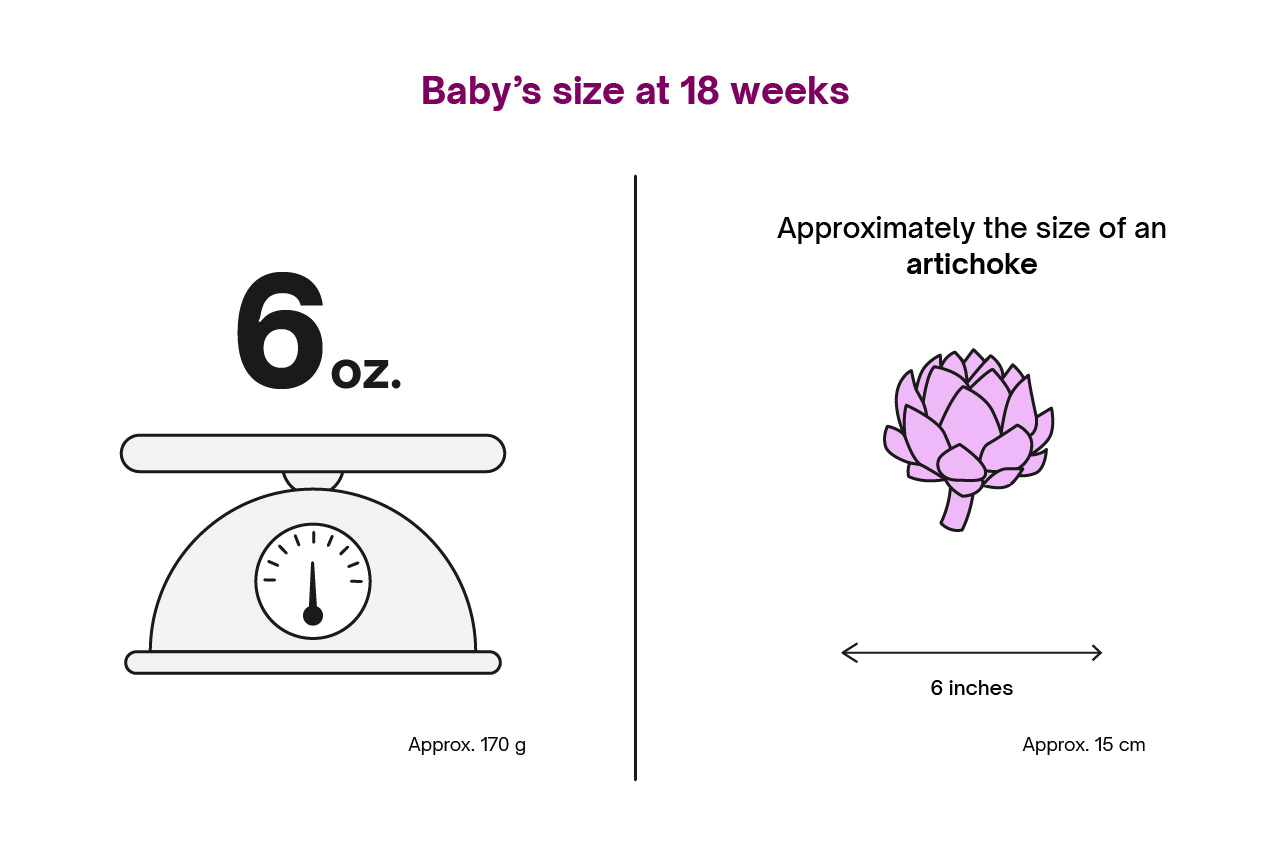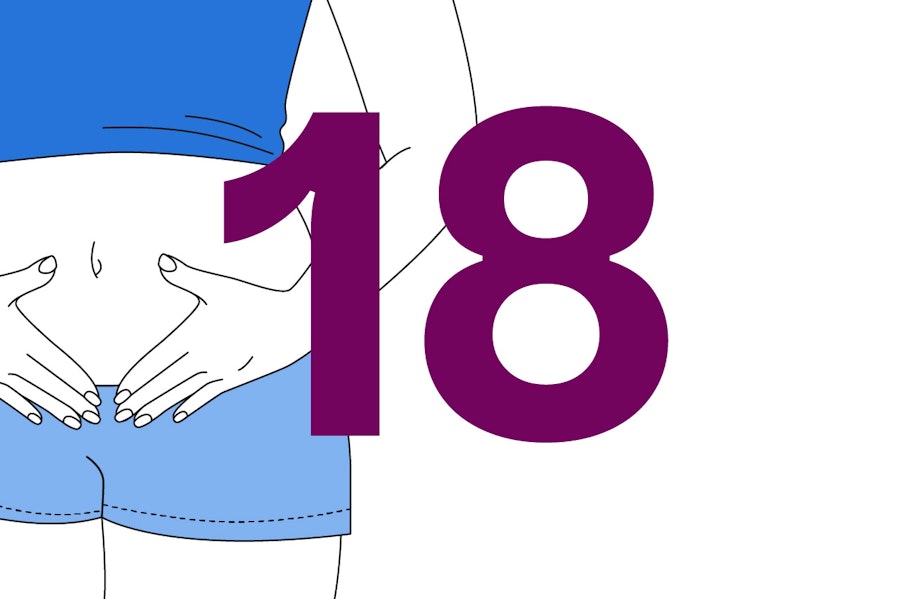18 Weeks pregnant: Symptoms, baby development and tips
Follows NC° Editorial Policy
At Natural Cycles, our mission is to empower you with the knowledge you need to take charge of your health. At Cycle Matters, we create fact-checked, expert-written content that tackles these topics in a compassionate and accessible way. Read more...
Key takeaways:
- As you get more familiar with your baby’s movements, you will begin to notice them getting stronger and more frequent
- Your body is working hard to circulate a greater volume of blood through your body during pregnancy, which can have a knock-on effect on things from the development of varicose veins to swelling and dizziness
- The anatomy or second-level ultrasound, usually offered between weeks 18 and 22, is used to check your baby’s physical development and can also let you know the sex of your baby (if you want to know ahead of the birth)
Welcome to week 18 of your pregnancy! In this guide, we will get into changes you might see and feel in your body this week, including baby kicks and varicose veins. We will check in on your baby’s development and talk about what you can expect in your upcoming ultrasound. Finally, we will touch on some week 18 pregnancy symptoms and offer some tips for taking care of your body and mind as you head towards the halfway point of your pregnancy.
Your body at week 18
Baby kicks
Between weeks 18-25, you will likely begin to feel your baby move in your belly. These movements can take some getting used to, especially because they can be very faint at the beginning. At first, it’s easy to confuse them with your own stomach gurgling or gas. Keep in mind that first-time moms tend to feel these movements later, so if you are not yet feeling much movement, try not to worry. At week 18, your baby still has a lot of space to move around in the uterus, and so while they are constantly moving, you might not be able to always feel it. The placement of the placenta also matters – if your placenta is in the front of your stomach (anterior) or the top, it can affect where and how much you feel movement.
As you become familiar with your baby’s movements, you will likely notice a pattern or times of the day when they are more active. In general, babies tend to be the most active after you eat a meal or something sweet, and in the evenings. It will be easiest to feel movements when you are sitting comfortably or lying down on your side.
At the start of your third trimester, your doctor or midwife might suggest you start keeping track of your baby’s movements, also known as counting kicks. The goal of counting kicks is to stay aware of your baby’s activity and to notice if there are any significant changes you need to communicate to your healthcare team. To count movements, it is recommended to pick a time of day when your baby is normally active, sit comfortably or lie down, and use one of two methods [1]:
- Start a timer and record how long it takes to feel 10 movements
- Count how many movements you feel in a set length of time (30 minutes to 2 hours)
At week 18, there is no need to count kicks, but rather focus on trying to familiarize yourself with your baby’s movements and patterns. If you are ever concerned about what you feel, or don’t feel, don’t hesitate to contact your healthcare provider.
Varicose veins
Have you noticed swollen, twisted, or lumpy veins just under the skin’s surface? These are known as varicose veins. They happen most commonly on the legs, but can appear anywhere, even on the vulva, during pregnancy. While common and usually not serious, they can cause sores, heaviness, burning, or aching where they appear. Purple, blue, or red spider-like veins on the surface of your skin are also varicose veins, but these are a milder version called spider veins [2].
Varicose veins happen in the superficial veins, which are those closest to the surface of the skin. Veins carry blood towards the heart (arteries carry blood away from the heart) and contain one-way valves. When these valves become damaged or weakened, blood can collect and cause veins to dilate, or expand. Increased pressure within your veins due to increased blood flow during pregnancy, as well as sitting or standing for long periods of time, can also weaken the walls of your veins and damage the valves [2].
For some, varicose veins that develop during pregnancy will go away or reduce significantly in size postpartum. However, it’s also possible that they remain [3]. During pregnancy, you can try to prevent and treat varicose veins by resting with your legs elevated whenever possible. Exercises like walking and swimming, if recommended in your pregnancy, can also help with blood circulation. Compression socks can also help reduce or prevent varicosities for some women, but check with your doctor or pharmacist about getting the correct compression strength. If you are concerned about your varicose veins, if sores develop, or if you experience pain on account of varicose veins, contact your healthcare provider.
Your baby’s development at 18 weeks
Even if you can’t always feel it, your baby is moving around constantly! They are practicing all kinds of different movements, including rolling around and kicking their arms and legs. Your baby can also hiccup, yawn, suck and swallow. They have been busy these last 18 weeks! Your baby’s genitalia are also fully formed and visible on an ultrasound scan, if your baby cooperates and gives the technician a good view [4].
This week your baby is around the size of an artichoke, measuring around 5.6 to 6.3 inches (14.2 to 16 centimeters) and weighing around 5.5 to 6.7 ounces (160 to 190 grams) [5].

Mid-pregnancy ultrasound
You will likely have an ultrasound, commonly called an anomaly, anatomy, or level-two ultrasound, between weeks 18 and 22 [6]. The purpose of this ultrasound is to check on the baby’s development and general health. A technician or midwife will take detailed measurements of the width and circumference of the head, the circumference of your baby’s abdomen, and the length of their humerus to check that they are growing on track. These measurements can also be used to estimate the baby’s weight.
At this point of your pregnancy, if you haven’t found out already, you can also ask to know the sex of your baby at this ultrasound. Choosing whether or not you find out the sex of your baby is a personal decision, and there is no right or wrong approach. Because the baby’s external sex organs are completely developed, an experienced midwife or technician should be able to tell you the sex with nearly 100% certainty. In some cases, your baby might not cooperate for the ultrasound, but hopefully with a little patience, they will give the right view.
Pregnancy Symptoms in week 18
Swelling in the feet and ankles
Swelling during pregnancy, called edema, is caused by your body retaining water. If you have been standing a lot, or if the weather is particularly warm, you will likely experience swelling in your feet and ankles. This tends to worsen as your pregnancy progresses. Pressure from your growing uterus can also worsen blood flow to your legs, contributing to swelling. While normal, you can help reduce swelling by trying not to stand for long periods of time, wearing comfortable shoes, resting with your feet up, and doing foot exercises or taking walks to improve circulation [7].
In some cases, sudden swelling, particularly in the face, hands, and feet, can be a sign of preeclampsia. Preeclampsia is a hypertensive disorder (relating to high blood pressure) that usually develops in the second half of pregnancy. While many cases of preeclampsia are considered mild, it requires immediate medical attention and monitoring for the safety of both mother and baby. If you notice your hands, face, or feet are suddenly swollen, or if you experience a bad headache, problems with your vision, or sudden severe nausea, contact your healthcare provider immediately [7].
Dizziness
Dizziness, or feeling faint, is commonly associated with the first trimester but can be experienced later in pregnancy as well. Dizziness is most commonly caused by low blood pressure and/or low blood sugar. Help ward off spells of dizziness by avoiding standing for long periods of time, sitting and standing up slowly, and eating regularly. Dizziness can be worse if you get overheated, and in the warmer months, so avoid taking hot showers and be sure to stay cool and hydrated outdoors.
If you experience dizziness alongside any pain in your abdomen or bleeding, contact your healthcare provider immediately [8].
Tips in week 18
- Think about maternity leave: as you reach the halfway point of your pregnancy, it’s a good idea to start thinking about maternity leave. Be sure to check what benefits are available to you where you live, as well as what benefits might be available through your employer. In some cases, your partner might be eligible for benefits through their employer or your local government as well.
- Learning about birth: whether you are interested in attending birthing classes or just want to do some research yourself, it is never too early to begin preparing for the process of birth. Familiarizing yourself with what you can expect before, during, and after labor can help you feel more prepared for the journey ahead to meet your little one.
- Make sure you’re getting enough iron: growing a baby requires your body to make a lot of extra blood. Whether or not you have been advised by your care team to take extra iron supplements, make sure you are getting enough iron in your daily diet. Beans, nuts, dried fruits, red meat, and fortified breakfast cereals (cereals that have added vitamins and minerals) can be good sources of dietary iron [9].
- Sleeping on your side: while many doctors will recommend sleeping on your side from the start of your third trimester, you can try starting to sleep on your side already in the second trimester. Side sleeping has been shown to provide the best circulation for you and your baby, and places the least amount of pressure on your veins and organs. Good circulation can also help with swelling, varicose veins, and hemorrhoids [10].
- Find a body pillow: a body or pregnancy pillow can help you get comfortable sitting or sleeping by providing extra padding and support. If you are suffering from pelvic or hip discomfort, or leg cramps, you can place part of the pillow between your knees when you sleep. The pillow can also help elevate your legs when you’re sitting to relieve swelling.
Tracking your pregnancy using Natural Cycles
As the first FDA Cleared birth control app, Natural Cycles aims to support you throughout all phases of your fertility and reproductive life. During your pregnancy, NC° Follow Pregnancy provides weekly guides and pregnancy symptom tracking so you can remain up-to-date on the changes going on in your body and with your baby’s development. After birth, NC° Postpartum provides daily guidance to help you navigate this new phase of life with your new baby. Why not see if Natural Cycles is right for you?
Did you enjoy reading this article?
